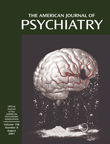To the Editor: The letter of Drs. Watson and Young relates to two methodological issues: the use of multiple baselines to more accurately measure baseline levels of neurohormones (e.g., cortisol) and the use of cortisol concentrations in particular as a covariate in the analysis of growth hormone release.
To clarify, we measured cortisol at two time points before administration of yohimbine. In effect, we had two baseline values for cortisol and growth hormone but chose the value at 30 minutes before administration as the reference baseline. The statistical validity of using one value as the baseline instead of averaging a number of values lies in the fact that an estimate based on averages from the same subjects decreases the within-subject correlation coefficient. This affects the repeated measures analysis of variance that is derived from the premise that within-subjects correlation is greater than between-subjects correlation.
The mean cortisol concentration at –30 minutes was 9.1 μg/ml (SD=8.4) for the anxious subjects and 6.5 μg/ml (SD=2.8) for the comparison subjects and was reported as such in the baseline results of the article. The cortisol levels at time 0 (immediately before administration of yohimbine) were 8.0 μg/ml (SD=6.7) for the anxious subjects and 6.8 μg/ml (SD=3.2) for the comparison subjects. The average of the two baseline values for all subjects yielded a baseline of 8.5 μg/ml (SD=7.4) for the anxious subjects and 6.7 μg/ml (SD=2.4) for the comparison subjects. The two groups did not differ on either baseline cortisol measure.
As Drs. Watson and Young suggest, we measured the correlations between cortisol and growth hormone concentrations at –30, 0, 60, 90, and 120 min; the correlation coefficients (ρ) were, respectively, –0.04, –0.21, 0.45, 0.37, and –0.20 for the anxious group and 0.50, 0.14, –0.70, –0.50, and –0.30 for the comparison group. The correlation values are modest; none approach statistical significance. Thus, the use of cortisol as a covariate does not appear to enhance the model.
To reiterate, this was a small study. Our hypotheses were formed to evaluate the effect of yohimbine on hormonal output, including cortisol and growth hormone. We agree that under most circumstances corticosteroids have the potential for interaction with growth hormone output from the pituitary but apparently not under the conditions or the population addressed by this study.

